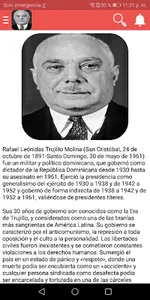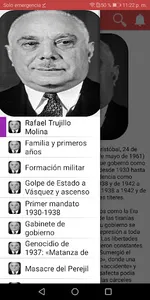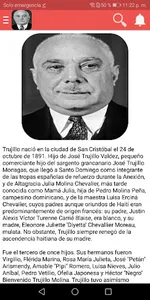Rafael Leónidas Trujillo Molina (San Cristóbal, October 24, 1891-Santo Domingo, May 30, 1961) was a Dominican military man and politician, who ruled as dictator of the Dominican Republic from 1930 until his assassination in 1961. He served as president. as generalissimo of the army from 1930 to 1938 and from 1942 to 1952 and he ruled indirectly from 1938 to 1942 and from 1952 to 1961, using puppet presidents.
His 30 years of government are known as the Era of Trujillo, and considered one of the bloodiest tyrannies in Latin America.His government was characterized by anti-communism, the repression of all opposition and the cult of personality. Civil liberties were non-existent and constant human rights violations were committed. He plunged the country into a state of panic and "respect", where a death could be covered up as an "accident" and anyone accused of disaffection could be imprisoned and tortured in one of the clandestine prisons dedicated to that practice.
Nevertheless, Trujillo's supporters highlight some positive aspects of the regime, such as the end of caudillismo as a source of political instability, the restoration of public order, and a certain economic development of the country.During his regime, all levels of the state functioned accordingly to his interests and established a business monopoly that allowed him to accumulate a large personal fortune.
The Trujillo government was responsible for the deaths of more than 50,000 people, including the thousands killed in the infamous Parsley Massacre. Total estimates of the death toll in the massacre range from 5,000 to 25,000. Robert Crassweller mentions those estimates and notes that "a figure between 15,000 and 20,000 would be reasonable, but still conjecture."
As a product of the National Guard, 19 created by the Americans during the first occupation of the country in 1916, Trujillo paid special attention to the Armed Forces.Military personnel received generous pay and benefits under his government, the army expanded numerically and equipment inventories were increased. Trujillo maintained control of the officer corps through fear, patronage, and frequent "task rotation."
The Trujillo regime developed in a fertile time for dictatorial regimes in Latin America, being contemporary with other similar governments within the Caribbean basin, although, according to some authors, its dictatorship was characterized by being more blatant, brutal and efficient than the others around him. In parallel, Trujillo had against several foreign governments opposed to his dictatorship, among them Rómulo Betancourt from Venezuela, Juan José Arévalo from Guatemala, Ramón Grau San Martín from Cuba, Elie Lescot from Haiti, and José Figueres Ferrer from Costa Rica.
His 30 years of government are known as the Era of Trujillo, and considered one of the bloodiest tyrannies in Latin America.His government was characterized by anti-communism, the repression of all opposition and the cult of personality. Civil liberties were non-existent and constant human rights violations were committed. He plunged the country into a state of panic and "respect", where a death could be covered up as an "accident" and anyone accused of disaffection could be imprisoned and tortured in one of the clandestine prisons dedicated to that practice.
Nevertheless, Trujillo's supporters highlight some positive aspects of the regime, such as the end of caudillismo as a source of political instability, the restoration of public order, and a certain economic development of the country.During his regime, all levels of the state functioned accordingly to his interests and established a business monopoly that allowed him to accumulate a large personal fortune.
The Trujillo government was responsible for the deaths of more than 50,000 people, including the thousands killed in the infamous Parsley Massacre. Total estimates of the death toll in the massacre range from 5,000 to 25,000. Robert Crassweller mentions those estimates and notes that "a figure between 15,000 and 20,000 would be reasonable, but still conjecture."
As a product of the National Guard, 19 created by the Americans during the first occupation of the country in 1916, Trujillo paid special attention to the Armed Forces.Military personnel received generous pay and benefits under his government, the army expanded numerically and equipment inventories were increased. Trujillo maintained control of the officer corps through fear, patronage, and frequent "task rotation."
The Trujillo regime developed in a fertile time for dictatorial regimes in Latin America, being contemporary with other similar governments within the Caribbean basin, although, according to some authors, its dictatorship was characterized by being more blatant, brutal and efficient than the others around him. In parallel, Trujillo had against several foreign governments opposed to his dictatorship, among them Rómulo Betancourt from Venezuela, Juan José Arévalo from Guatemala, Ramón Grau San Martín from Cuba, Elie Lescot from Haiti, and José Figueres Ferrer from Costa Rica.
Show More


